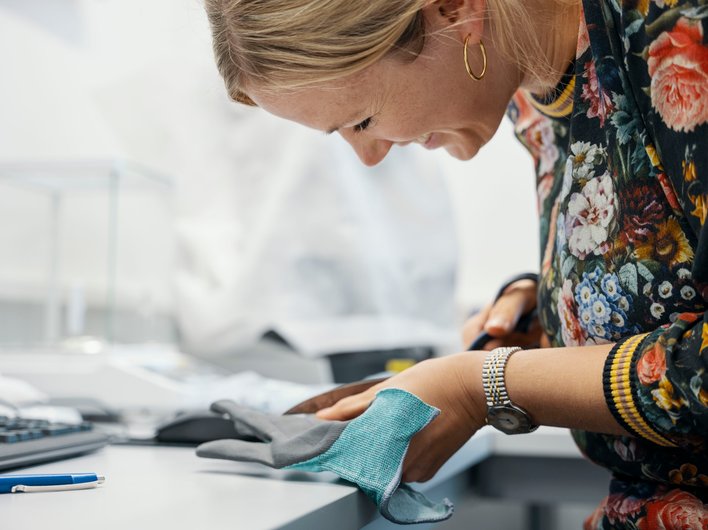We take our responsibilities towards human rights and the environment seriously. In this context, our business operations are aligned with the Social Standard and Code of Conduct, which have been integrated in our business practices. The uvex group’s mission statement on its human rights strategy was supplemented by way of the Social Standard and Code of Conduct and approved by the company management.
We assess the potential or actual impact of our business activities on these areas on an ongoing basis. In this way, we are able to avoid, reduce or eliminate negative impacts and bring about positive changes. We regularly review our due diligence processes to ensure their efficacy and adapt these as necessary. When it comes to selecting suppliers, we use a supplier self-assessment to review our requirements for compliance with human rights and environmental standards. Finally, at least once per year, we communicate the most important risks and consequences identified through our analysis via the website. Further information regarding our programme and individual processes can be found in the sections below.
Monitoring, preventative and remedial measures
All core suppliers are committed in writing via a Quality Agreement to comply with the Guiding Principles of the United Nations and OECD, as well as our Social Standard. This sets out the basic aspects of cooperation, such as human rights, labour practices, health and safety, environmental management, quality management, operations, working from home and subcontracting, anti-corruption, bribery and the granting of benefits, as well as minerals from conflict and high-risk countries.
Compliance with the commitments is ensured by auditing suppliers in collaboration with the external service providers or our own trained staff. In the past financial year, 28 external audits of suppliers were conducted, with a total of 197 measures for continuous improvement identified.
In addition, the uvex group appointed a Human Rights Officer to implement and monitor the requirements of the Supply Chain Act (Lieferkettengesetz – LkSG) on an internal basis.
To ensure that the legal requirements are adequately implemented, digital learning content covering topics such as the LkSG, the Social Standard and Code of Conduct is regularly provided. In the past financial year, we informed more than 370 suppliers and 3,000 employees about the availability of this e-learning content.
In the event of an infringement of a protected legal position, remedial measures are to be immediately defined and implemented as deemed appropriate by the respective SBU manager(s). These measures are to be devised and implemented in conjunction with the supplier in question. Where incidents of this nature are identified, the BE department must be informed without delay. It is only in extreme cases that replacement suppliers should be considered, for example if the remedial measures prove to be unsuccessful in the wake of a human rights violation or the supplier appears unwilling to cooperate properly.
Risk management and analysis
We aim to identify at an early stage and ultimately avoid the human rights-related and ecological risks that can arise in relation to our business activities. To achieve this, we have integrated a risk management system as part of our supplier evaluation process, which assesses all suppliers and service providers on the basis of country risk, supplier relationships and the results of audits. This risk and supplier assessment is updated annually or, as the case may be, revised during the year in the event of anomalies. For the categorisation of the country risk, we use the "CSR Risk Check" as an external source. Suppliers are informed once a year of the results of the assessment carried out.
In the 2022/23 reporting year, no infringements of human rights or environmental obligations were identified.
Complaints procedure
We have put in place various reporting channels so as to ensure responsible business operations at all times.
Employees, suppliers and subcontractors can report violations of the uvex group’s Social Standard by contacting compliance@uvex.de. These reports can be made confidentially and the identity of the reporter is not disclosed.
Our business partners are obliged to ensure that subcontractors, suppliers and their own business partners are also informed about this reporting procedure and made aware of its confidential nature.
In addition to the contact option mentioned above, an external ombudsman service has also been established. This can be reached as follows:
Ombudsman service:
Baker Tilly Rechtsanwaltsgesellschaft mbH
Nymphenburger Str. 3b
80335 Munich
Germany
Tel.: +49 89 55066-525
E: ombudsservice.uvex@bakertilly.de
More detailed information on our whistleblower system can be found here:

uvex and the EU Chemicals Regulation REACH
The chemicals regulation REACH (Registration, Evaluation, Authorisation and Restriction of Chemicals; Regulation (EC) No. 1907/2006) has governed chemicals legislation within the EU since 1 June 2007. It goes without saying that we fully comply with the obligations arising from the overarching objectives and implementation of REACH regulations. After all, protecting people – and the environment too – is a definitive priority for us in connection with the use hazardous chemical substances. And it has been this way for many years. Since as far back as 2007, the uvex group has been developing an internal Restricted Substances List (RSL), for which the requirements are even stronger than the statutory requirements linked to the REACH regulation. This RSL is regularly updated in order to rapidly react to the latest scientific findings. The use of hazardous substances is therefore fundamentally prohibited in uvex products. When, in exceptional circumstances, the use of such substances is unavoidable, incredibly stringent conditions apply.
Our suppliers must therefore confirm that they ensure compliance not only with the REACH regulation, but also with the internal uvex RSL too. In addition, compliance with all threshold values specified there is verified by independent laboratories on a regular basis. The test samples are obtained directly from our suppliers on site as well as from our own warehouses. We receive more than 600 test reports per year, which equates to tens of thousands of individual test results (as at 2019).

